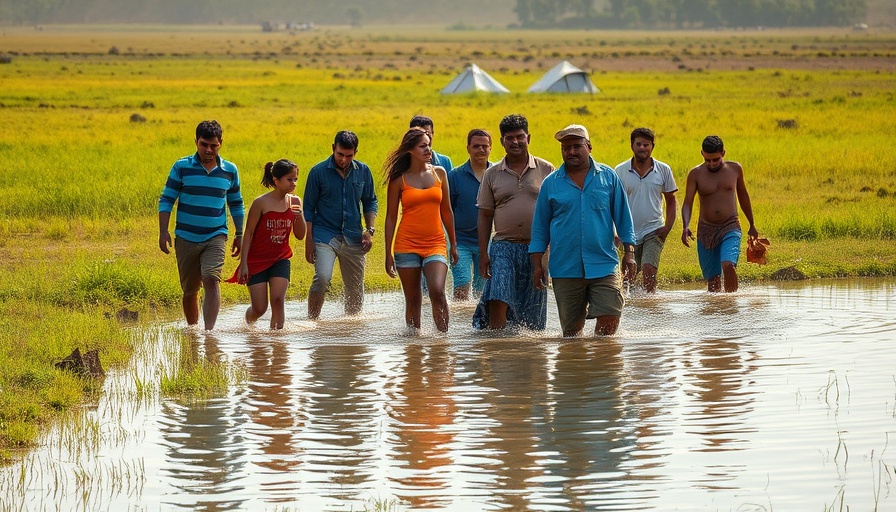
US Demands Rwandan Troop Withdrawal: A Catalyst for Peace?
In a pivotal move indicating the complexities of regional politics, the United States has expressed firm intentions that Rwanda must withdraw its troops from eastern Democratic Republic of Congo (DRC) before formalizing a peace agreement. This development arises from ongoing tensions exacerbated by the M23 rebels and the DRC’s armed forces (FARDC), which have created a dire humanitarian situation, compelling civilians to seek refuge.
The backdrop to this negotiation is charged with historical significance. The legacy of the Rwandan genocide looms large over current relations, complicating Rwanda’s perspective on security threats from armed groups operating within the DRC. President Trump’s administration, brazenly ambitious in its proposal to finalize a peace deal in just two months, is entrenched in negotiations that could ultimately reshape the political landscape in Central Africa. As highlighted by Trump’s Senior Adviser for Africa, Massad Boulos, the pathway to peace is envisioned through a restructured agreement that would also attract billions of dollars in Western investment into DRC’s mineral-rich territories.
Rwanda’s Perspective: National Security vs. International Pressure
“Rwanda views its military presence in the DRC as essential to countering threats from groups like the FDLR, which are linked to the 1994 genocide.”
This brings forth an essential counterargument as Rwanda defends its troop strategy as a necessary means of countering perceived existential threats. As Kigali prepares to navigate this pressure from Washington, the question remains: will security concerns outweigh the diplomatic pressure? The balancing act required by Rwanda highlights the intricate web of beliefs and political challenges in the region.
A Draft Peace Agreement: What’s at Stake?
The proposed draft peace agreement, as confirmed by multiple diplomatic sources, demands the withdrawal of all Rwandan military assets from the DRC as a precondition for further discussions. This document represents a significant evolution from the earlier consensus, which merely acknowledged both countries’ concerns about sovereignty and territorial integrity. The stakes are high as diverse perspectives come into play, debating whether such demands could ultimately foster peace or escalate tensions.
Broader Implications for African Politics
The ramifications of this geopolitical strategy extend far beyond Rwanda and the DRC. It brings to light the crucial role of foreign intervention in African geopolitics, particularly within the framework of international trade agreements and investments that depend on regional stability. As the DRC is endowed with valuable minerals like cobalt and lithium—critical components for the global tech industry—the interest from foreign entities will increase should peace be realized.
Furthermore, this political maneuvering may influence the upcoming South African national elections, especially as issues of regional stability intersect with local policies. The ANC's approach to foreign relations could impact its standing amidst the electorate’s demands for transparency and policy accountability.
Looking Forward: Predictions and Challenges Ahead
As the proposed timeline set forth by the US approaches, various challenges loom. How will Rwanda respond? Will the DRC and Rwanda cooperate, or will entrenched positions lead to further conflict? Regional observers speculate that should Rwanda refuse to comply fully with US demands, it may lead to increased isolation and potentially affect aid and investment flows.
In light of these dynamics, it remains imperative for stakeholders—both local and international—to advocate for a solution grounded in mutual respect and recognition of historical grievances. As political entities gear towards resolving this latent conflict, it’s essential to cultivate an environment conducive to dialogue and collaboration.
Final Thoughts: The Path to Lasting Peace
This auspicious moment presents a clear opportunity for reformative policies that prioritize peaceful coexistence and economic collaboration among African nations. Investors, policymakers, and citizens alike have a stake in shaping the outcomes of these discussions. Investing empathy into the mechanics of politics can ultimately garner changes that transcend borders.
As discussions advance, it is crucial for the international community to remain vigilant and supportive of inclusive solutions that engage all parties involved in a bid for sustainable peace and security.
In conclusion, navigating these complex geopolitical waters necessitates robust dialogue, understanding historical contexts, and recognizing intertwined fates in a fast-evolving political landscape.
 Add Row
Add Row  Add
Add 




Write A Comment